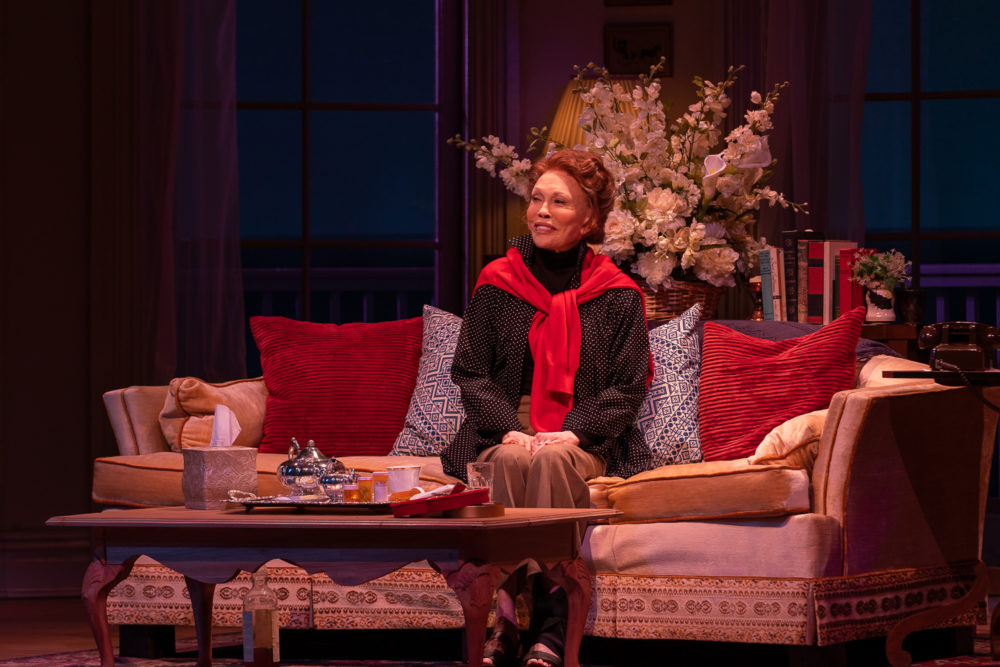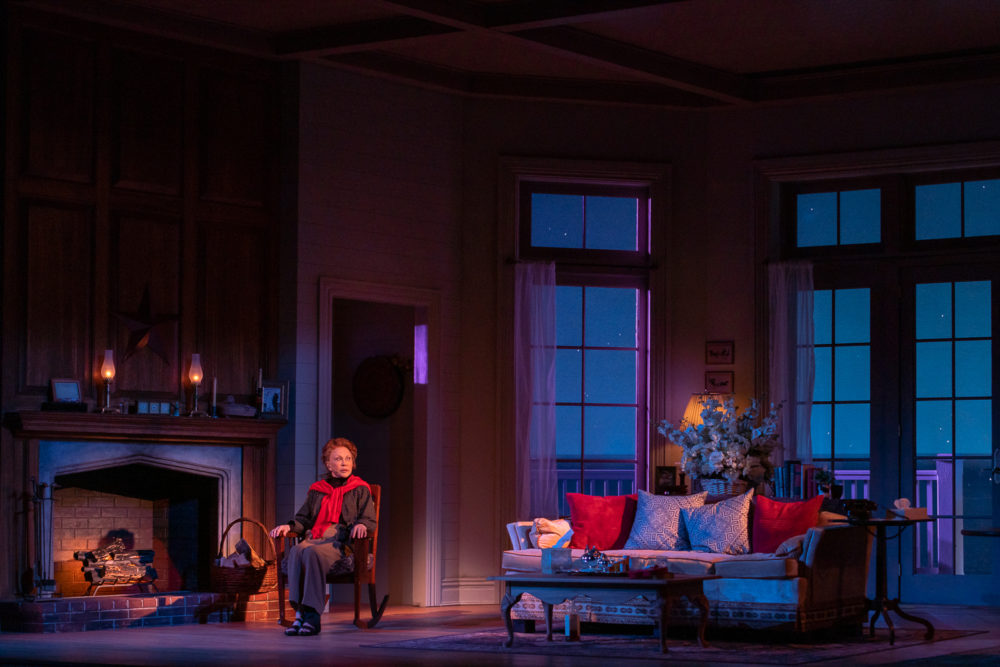Advertisement
Review
In 'Tea At Five,' Faye Dunaway As Katharine Hepburn Crystallizes These Hollywood Icons' Legacies

It’s been decades since Faye Dunaway has performed on stage. And it’s fitting that the Oscar winner would return for Matthew Lombardo’s “Tea at Five.”
In the one-woman show, she portrays a 76-year-old Katharine Hepburn in the cozy living room of her father’s home in Fenwick, Connecticut — just in time for evening tea. As the peachy sun sets behind her, Hepburn reminisces about her tragedy-stricken childhood, her difficult journey to stardom, and her irresistible lovers.
Lombardo has redeveloped “Tea at Five” from a two-act play that depicted Hepburn at 31 and 76, to a now Broadway-bound one-act premiering at Boston’s Huntington Avenue Theatre that focuses solely on Hepburn in her 70s. A car accident has left her with an injured ankle, but that doesn't stop her from abandoning her cane to parade across the living room with the utmost confidence. In this role, the illustrious Faye Dunaway is just as strong-willed and independent as the real Hepburn was known to be. “Nothing pisses me off more than someone who is trying to spoil my perfectly vicious reputation,” quips Dunaway, who has risen to the top of Hollywood playing powerful and complicated women like Bonnie in “Bonnie and Clyde.” Dunaway and Hepburn share a self-assured edge sharp enough to cut through the unforgiving aspects of the entertainment industry.
The play unfolds like a memoir, marking each prominent experience in Hepburn’s personal and professional life. It is a sweet and simple summary. But the embodiment of one Hollywood icon by another is what brings character and style to the piece. Dunaway illuminates Hepburn’s stubborn cynicism and fearless confidence with her wry delivery and sharp timing. She jokes about how tacky she believes her funeral would be: “Calla lilies everywhere,” Dunaway declares in Hepburn’s classic mid-Atlantic accent with a roll of her eyes.
The audience erupted in laughter at the pointed reference to Hepburn’s hit movie “Stage Door” where Hepburn speaks the memorable line, “the calla lilies are in bloom again” as aspiring actress Terry Randall. If you’ve seen the movie, you know that the young actress struggles to deliver the line with emotion, but she finally proves she can act by reciting it in performance with heartbreaking honesty after learning about the suicide of a fellow actress. If you really know Hepburn, you know that the line was taken from the unsuccessful play “The Lake,” a disastrous experience when she first recited the line.

Along with Hepburn's iconic feisty personality, Dunaway delicately captures what seemed to be at the core of Hepburn’s essence — her protectiveness over her own vulnerability.
At a particularly moving moment, Hepburn relives the emotionally taxing history of her 27-year relationship with actor Spencer Tracy. There is no mention of Tracy and their tumultuous affair until half way through the 75-minute show. She begins talking to “Spence” himself as if the audience has melted away. She demands he let her in, both literally and figuratively — the man was a tormented alcoholic. But suddenly, she begins to interchange his name with “Tom,” her brother who committed suicide at age 15. As a young girl, she discovered Tom hanging after she banged down his door, demanding, “Let me in!” The traumatic reliving of both moments comes to a halt as her awareness of us suddenly resurfaces. Hepburn catches herself opening up too much to us, an audience that has been listening so attentively.
Advertisement
She abruptly shakes herself out of this moment of vulnerability and launches into a story about another play she performed in, feigning levity and a smile through tears. I felt a sudden pang of grief for someone I’ve only known from old movies; I now understood the protective walls that the real Hepburn must have built up in order to guard her own privacy and fragility from the public. She was notoriously private from the press and her fans and rejected many aspects of celebrity culture. Dunaway defines the scars of pain under the surface of Hepburn’s tough demeanor.
Although there were instances where I craved more depth and insight from the script itself (at times, it felt like a very thorough chronological list of milestones in Hepburn’s career), I settled in to the nostalgic storytelling. Dunaway’s Hepburn weighs her successes and failures with grace and perspective. We are let in on her secrets to staying driven and persistent. She leaves us with tiny nuggets of wisdom, especially advice on how to be a strong and independent woman in a world that is constantly trying to control you. Some takeaways: Always pay attention to detail, maintain one’s drive by protecting one’s talent, and be wary of falling for a man who drinks because “he will always choose the drink over you.”
Dunaway honors Hepburn’s eccentricity, carefully guarded vulnerability, and her grit. “If you’re good to your work, your work will be good to you,” she insists in the final moments of the play. The piece, although simple, is a tribute to the mark that both stars have left on our collective memory: Faye Dunaway’s ability to capture the complexities of a woman on screen and stage and Katharine Hepburn’s steadfast determination to live life her own way live on.
"Tea at Five" continues at the Huntington Avenue Theatre through July 14.
